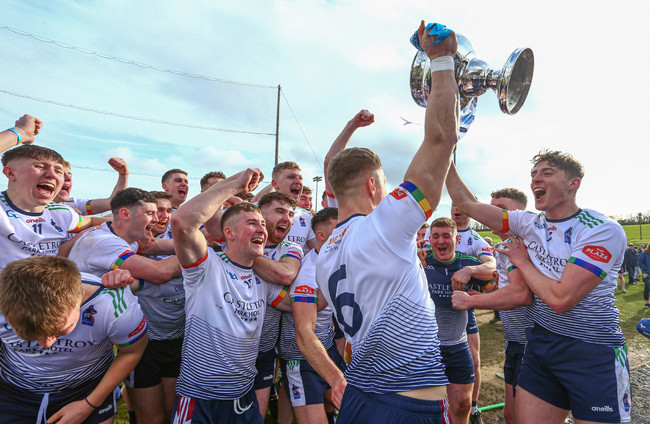LAST UPDATE | 24 Feb 2023
BACK IN THE darkest times of Covid lockdowns, we did what was probably essential and looked for a few silver linings.
The cancellation of almost everything that made up our routines showed us that we were doing too much. By the time we spent half the day trying knock a cup off the top of a car with a soft sliotar, we realised we’d been burning ourselves out before.
Has the lesson been absorbed? Of course not. As soon as the handbrake came off, we weren’t long in finding the old frantic rhythm, particularly when it came to sports. Fixture pile-ups and stressed drives from one training session to the next returned – and that was just with our kids battling it out in the U7 ranks.
In the world of inter-county GAA, well, you know the story. I’m not the only one who has said that we’d need a 13th month and a roof over every field to see us right.
To argue for the retention of certain competitions and the returns of others makes little practical sense, but as in every endeavour, there is cold logic and that small bit of magic. You’re in a bad place if you lose either.
I remember the bus journey from our hotel to Parnell Park for the Fitzgibbon Cup final in 2009. I remember it so well because unlike other similar journeys, I was not fraught with nerves; I would put myself under self-debilitating pressure in my younger days.
Eddie Enright, our selector, sat down next to me before the bus left and started chatting away. We discussed everything except hurling and arrived at the ground in what seemed like no time at all. I was in a far healthier frame of mind than I would have been had the chat not happened.
I never asked Eddie or the late Paul O’Connor, our manager, if this was a small plan they had for me. It would have been Paul’s form, a quiet, no-fuss show of empathy.
Paul made us fall in love with the Fitzgibbon Cup. He impressed on us what it had meant to him as a student, and emphasised the friendships that would endure. When we won the competition, he told us to make sure that we spent as much time as possible together in the coming days.
I could meet one of my Fitzgibbon teammates now that I haven’t seen in an age, yet it’s so easy to pick up the thread because the shared experience was so vivid.
Paul went with the spirit of the competition. John Mulhall would be doing outrageous things in training, flicking the ball over his head and turning onto it like it was a PlayStation manoeuvre. This wouldn’t have gone down well in many county set-ups, but Paul took it as part of the ecosystem — not that it was all tricks and flair, or a Barbarians of hurling approach.
When we lost to CIT, Paul took us to the Farm in Bishopstown the next day. The training session was just backs against forwards. Every other puckout seemed to result in a row. It was raw and edgy stuff and at the end, Paul called us in.
“That’s the training session that’s going to win us the Fitzgibbon Cup,” he said.
The significance of these moments is always embellished following victory, but I promise you that every one of us believed Paul. It was one of those rare moments where you just knew.
I’ve said before that my relationship with the Fitzgibbon has waxed and waned over the years. It went from meaning everything as a student, to being an injury hazard and a distraction for teammates when I was playing with Cork. And now that I’ve been blessed to be involved with UL in the past two seasons, I’m one of those guys who is making phone calls to understandably nervous inter-county managers.
It’s not part of the sales pitch to those managers, but part of what we offer the players is something that’s so important because in ways it’s unimportant. The media spotlight is a fraction of its inter-county wattage. The crowd is made up of family and friends. The accolades from victory, or fallout from defeat, do not come close to what they’ll be later in the year.
“You’re not under pressure here,” is the message I say again and again. They’ll be under pressure with their counties, which is fine, but not today.
Training is once a week; we had it on a Monday night. A warm up, a puck around, a bit of work on set plays, some shooting, and then a video session that lasts 20 minutes. The whole lot took an hour-and-a-half, then it was out the gap.
The most heartening aspect of the Fitzgibbon remains; you’d get a buzz seeing the bonds develop between Tipp and Kilkenny lads like Brian O’Meara and Darragh Corcoran, and Cork and Waterford boys such as Sean Twomey and Mickey Kiely. In the months ahead, they’ll go beyond any anaerobic and mental threshold to get a half a block on each other, but they’re friends now and will be long after their top-level playing days are done.
The GAA by its nature is parochial and tribal but there is a tremendous benefit in playing with those from the other side of the hill. The Fitzgibbon still gives us that, the Railway Cup no longer so.
That competition meant a lot to me – to the extent that I got slagged fairly mercilessly at one point. We were on our way to play Ulster in Armagh and stopped off for food. Myself and a few others were sitting down: Tom Kenny, Pa Cronin, Hoggie, Paudie O’Sullivan. The bus driver was with us and made a harmless comment about the Cork lads being together.
“Sure aren’t we all Munster men tonight,” I said.
I got destroyed, and it was brought up more than once in the future. And yes it came out far more earnest and grandiose than I’d intended, but the thing was that I believed it. Still do.
Pulling on the Munster jersey gave me a surge of energy and pride. How could you wear this shirt and not think of Christy Ring and Mick Mackey and the Doyles and Rackards and thousands of people pedaling bikes for hundred-mile round trips to see them play?
In the dressing room, I heard Lar Corbett talking to his fellow forwards, many of whom were from Cork. “Ye get the scores, lads. I’ll do my best to get hooks and blocks in for ye.” This is Lar Corbett, like, hurling’s most lethal goalscorer at the time and he’s going out to graft for you.
Brendan Cummins was in the panel, an immense thrill for me. I’d won the All-Star in 2013 but was still taken aback when Liam Sheedy put me on at the start.
To work with Sheedy, even in that more low-key environment, was cool; to see his management skills and charisma up close. It was similar with Anthony Daly later. These are the things which enrich you.
Also in that category was the long puck competition in the Cooley Mountains. County commitments meant that I did that only once. I finished well outside the medals, sixth out of 12, but it was just such a memorable experience; the elements, your feet struggling for purchase in the terrain, the feeling that you were part of something enduring, a link to the origins of our game, and something which I hope will be preserved and respected as such.
I know we hurling people often stand accused of speaking of our sport in overly reverent terms. We stray into mysticism quite readily, and to be honest, I’m ok with that.
I believe unapologetically that this game is magical, that it brings us together in ways we struggle to fully appreciate. It binds us to dead generations from last century and a lot more centuries before that. For as long as anyone can tell, we’ve hewn sticks from the roots that grow down into our soil. As we hold them then we’re grounded in where we’re from while our imaginations fly. With hurleys we express ourselves in a way we find far more onerous with mere language.
Pucking a ball across a mountain is at the same time mad and an entirely natural way to connect with who we’ve been for millennia.
The Railway Cup might have more of a chance of return than the old tram network of Cork city – but perhaps the rush towards progress wasn’t so progressive in the ditching of either.
Playing for your county is a glorious thing. But it should never be the only thing. The split season has given new life to clubs, but there are other elements of GAA we should protect.
The squeeze will come on the Fitzgibbon from county managers. This is rational – the competition puts them under considerable stress. The county game brings the kind of money the GAA needs to develop, not that we’d argue that its status is as a result of money. Playing for Kilkenny or Waterford or Galway or anywhere remains the highest honour.
Yet those teams are made up of people who benefit hugely from a variety of experiences had and friends made beyond the parish and county borders.
If there is any fat to be cut from the season, and I appreciate there is little, then the January pre-season competitions are the place to start. Even then, there is too much to get through in the time left, but we should be minded of who we are and where we came from.
We started to play this game for the sheer joy of it. Those pockets of joy that remain at the top level should be protected most seriously.











Excellent article